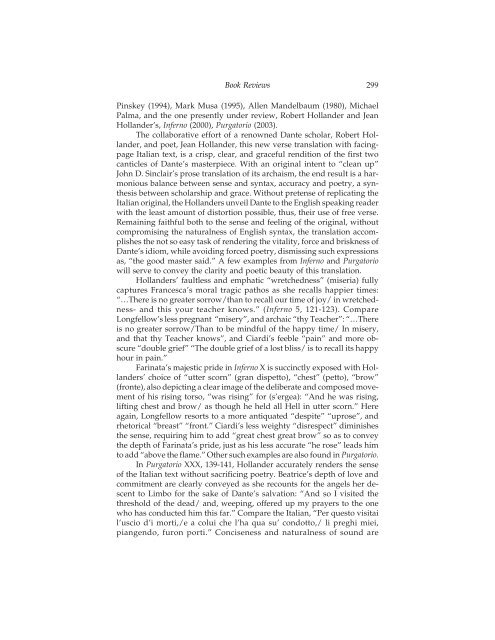Journal of Italian Translation
Journal of Italian Translation
Journal of Italian Translation
Create successful ePaper yourself
Turn your PDF publications into a flip-book with our unique Google optimized e-Paper software.
Book Reviews 299<br />
Pinskey (1994), Mark Musa (1995), Allen Mandelbaum (1980), Michael<br />
Palma, and the one presently under review, Robert Hollander and Jean<br />
Hollander’s, Inferno (2000), Purgatorio (2003).<br />
The collaborative effort <strong>of</strong> a renowned Dante scholar, Robert Hollander,<br />
and poet, Jean Hollander, this new verse translation with facingpage<br />
<strong>Italian</strong> text, is a crisp, clear, and graceful rendition <strong>of</strong> the first two<br />
canticles <strong>of</strong> Dante’s masterpiece. With an original intent to “clean up”<br />
John D. Sinclair’s prose translation <strong>of</strong> its archaism, the end result is a harmonious<br />
balance between sense and syntax, accuracy and poetry, a synthesis<br />
between scholarship and grace. Without pretense <strong>of</strong> replicating the<br />
<strong>Italian</strong> original, the Hollanders unveil Dante to the English speaking reader<br />
with the least amount <strong>of</strong> distortion possible, thus, their use <strong>of</strong> free verse.<br />
Remaining faithful both to the sense and feeling <strong>of</strong> the original, without<br />
compromising the naturalness <strong>of</strong> English syntax, the translation accomplishes<br />
the not so easy task <strong>of</strong> rendering the vitality, force and briskness <strong>of</strong><br />
Dante’s idiom, while avoiding forced poetry, dismissing such expressions<br />
as, “the good master said.” A few examples from Inferno and Purgatorio<br />
will serve to convey the clarity and poetic beauty <strong>of</strong> this translation.<br />
Hollanders’ faultless and emphatic “wretchedness” (miseria) fully<br />
captures Francesca’s moral tragic pathos as she recalls happier times:<br />
“…There is no greater sorrow/than to recall our time <strong>of</strong> joy/ in wretchedness-<br />
and this your teacher knows.” (Inferno 5, 121-123). Compare<br />
Longfellow’s less pregnant “misery”, and archaic “thy Teacher”: “…There<br />
is no greater sorrow/Than to be mindful <strong>of</strong> the happy time/ In misery,<br />
and that thy Teacher knows”, and Ciardi’s feeble “pain” and more obscure<br />
“double grief” “The double grief <strong>of</strong> a lost bliss/ is to recall its happy<br />
hour in pain.”<br />
Farinata’s majestic pride in Inferno X is succinctly exposed with Hollanders’<br />
choice <strong>of</strong> “utter scorn” (gran dispetto), “chest” (petto), “brow”<br />
(fronte), also depicting a clear image <strong>of</strong> the deliberate and composed movement<br />
<strong>of</strong> his rising torso, “was rising” for (s’ergea): “And he was rising,<br />
lifting chest and brow/ as though he held all Hell in utter scorn.” Here<br />
again, Longfellow resorts to a more antiquated “despite” “uprose”, and<br />
rhetorical “breast” “front.” Ciardi’s less weighty “disrespect” diminishes<br />
the sense, requiring him to add “great chest great brow” so as to convey<br />
the depth <strong>of</strong> Farinata’s pride, just as his less accurate “he rose” leads him<br />
to add “above the flame.” Other such examples are also found in Purgatorio.<br />
In Purgatorio XXX, 139-141, Hollander accurately renders the sense<br />
<strong>of</strong> the <strong>Italian</strong> text without sacrificing poetry. Beatrice’s depth <strong>of</strong> love and<br />
commitment are clearly conveyed as she recounts for the angels her descent<br />
to Limbo for the sake <strong>of</strong> Dante’s salvation: “And so I visited the<br />
threshold <strong>of</strong> the dead/ and, weeping, <strong>of</strong>fered up my prayers to the one<br />
who has conducted him this far.” Compare the <strong>Italian</strong>, “Per questo visitai<br />
l’uscio d’i morti,/e a colui che l’ha qua su’ condotto,/ li preghi miei,<br />
piangendo, furon porti.” Conciseness and naturalness <strong>of</strong> sound are
















